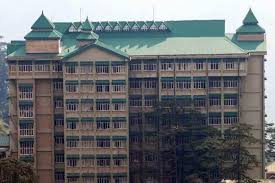(A) Code of Civil Procedure, 1908 – Order 41 Rule – Additional Evidence – Due diligence – It was asserted that the document was not within the knowledge of the applicants/defendants and the same could not be produced. This is factually incorrect. The copy of the document sought to be produced on record was filed before the learned Trial Court as Mark-A, therefore, the document was not any available but its copy was also filed before the learned Trial Court. Therefore, the plea taken by them that they could not produce the document before the learned Trial Court because the existence of the document was not known to them is not correct. The defendants had failed to satisfy the requirement that they could not produce the document before the learned Trial Court despite the exercise of due diligence; therefore, the application for additional evidence was rightly dismissed by the learned Appellate Court. (Para 20, 21)
(B) Indian Succession Act, 1925 – Section 63 – Will – Execution of – Plea that the Will was executed in English and Punjabi. The Will in Punjabi was signed by two persons and there was sufficient compliance with the requirement of Section 63 of the Indian Succession Act. This submission is not acceptable.
The witness has only referred to the Will, which is in English. He has not proved the Will in Punjabi. He has not stated that the deceased had put his thumb mark on the Will in Punjabi and the attesting witnesses had also put their signatures in the presence of Rikhi Ram on the Punjabi version. Therefore, his statement does not prove the due attestation of the Will in Punjabi. This witness has also not stated that the Will in Punjabi was thumb-marked in his presence. He did not say tha the and other witnesses had put their signatures on the Punjabi version in the presence of the testator. Hence, the statement of this witness does not prove the due execution of the Will in Punjabi. Execution of Will not proved. (Para 25, 26, 28)
(C)Will – Admission by plaintiff – Plea that the plaintiff did not dispute the execution of the Will. Plea rejected – Held: If the plaint is read in the whole, it shows that the plaintiff had disputed the execution of the Will and it cannot be said that there was any admission on the part of the plaintiff. (Para 39, 40)
(D) Possession – Admission – Plea that the plaintiff admitted that she was in possession and the learned Courts below had erred in granting the decree of possession. Plea rejected – Held: The plaintiff indeed asserted on oath that she was in possession; however, this fact was disputed by the defendants, who claimed their possession. They led the evidence and asserted that the plaintiff was residing with her mother and the defendants were in possession. Once the defendants asserted their possession, learned Courts below cannot be faulted for finding them in possession and delivering the possession to the plaintiff who was found to be the rightful owner. (Para 41)
HIGH COURT OF HIMACHAL PRADESH
2023 STPL(Web) 231 HP
[2023:HHC:11453]
Krishan Kumar And Another Vs. Sunita Kumari
RSA No. 376 of 2009-Decided on 3-10-2023
https://stpllaw.in/wp-content/uploads/2023/10/2023-STPLWeb-231-HP.pdf







